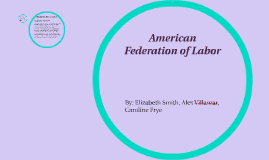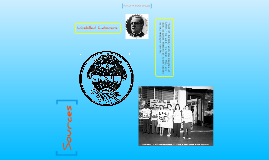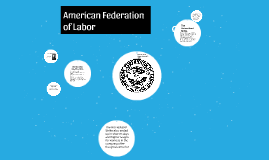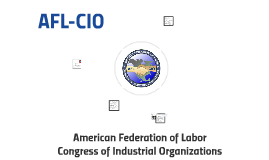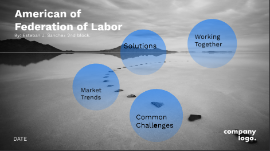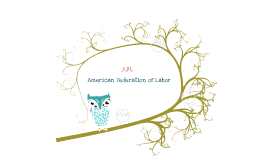American Federation of Labor
Transcript: Methods used to combat labor unions The Pullman strike resulted in 30 deaths and $80 million in damages. The federal government obtained an injunction against the union and eventually the army was called in to control the strikers. Violence broke out across many cities, and the strike finally collapsed. The political changes of Debs after his arrest and conviction American Federation of Labor By: Elizabeth Smith, Alex Villamar, Caroline Frye The labor unions at the Haymarket riot wanted 8 hour work days, and wanted to retaliate against "police brutality", but the riot ended terribly with the death of 7 police, and 100 citizens injured. The strikers were interfering with trains and damaging them, so he called in the army to stop them. He wanted to save the nation from the forces of socialism and anarchy. Who was Eugene V. Debs? Why Did President Cleveland intercede on behalf of the railroad companies? A popular way that unions struck was called a lockout. This was a temporary work stoppage or denial of employment initiated by the management of a company during a labor dispute Companies would combat this through *Blacklist-Employers would tell other companies who were in labor unions, which made it difficult to get a job in that area *injunctions- an authoritative warning or order from federal courts *Yellowdog contracts-agreements between employees and employer in which the employee agrees to not join a labor union Reasons for unrest *Long Hours (No set amount) *Bad Working conditions *Factories were dirty, poorly ventilated and unsafe *Workers were paid as little as the free market allowed, while their upper class employers accumulated more and more wealth *Lead to Trade unions-organization of workers who have come together to achieve common goals such as protecting the integrity of trade *Created Industrial Unions- all workers in the same industry are organized into the same union regardless of skill or trade-thus giving workers in one industry more leverage in bargaining This famous railroad strike was caused by wage cuts and lay offs. The American Railroad Union stuck against the Pullman Company. Nearly 4,000 factory employees began a wildcat strike that began in response to reductions in wages. Eugene V. Debs founded the American Railroad union which consisted of unskilled railroad workers. When the Pullman Company refused recognition of the ARU or any negotiations, ARU called a strike against the factory. In order to win, Debs decided to stop the movement of Pullman cars on railroads. They also implimented a massive boycott against all trains that carried a Pullman company car. Lynn Mass. shoe worker strike Great Railroad strike Southwest Railroad strike Molders lockout Haymarket square riot Pullman Strike Major strikes and outcomes Negative associations developed by Labor unions After the Haymarket Square riot, where 7 policemen were killed and over a 100 people were injured, critics of labor unions pounced on the opportunity to discredit labor unions by linking them to radicals and violent anarchists. This event squandered the labor unions' reputations and made them less popular across America. American Union leader and the candidate of the Socialist Party of America for a presidential election five times One of the best known socialists: supporter of socialism in which there is social ownership of the means of production and cooperative management of the economy Instrumental in the founding of the American Railway Union: one of the first industrial unions in the U.S. "I am for socialism because I am for humanity. We have been cursed with the reign of gold long enough."- Eugene V. Debs Pullman strike Debs was convicted of federal charges for defying a court injunction against the strike and jailed for 6 months While in jail, he read about Karl Marx and learned about socialism and marxism Upon his release he launched his career as the nation's most prominent socialist in the early 20th century







